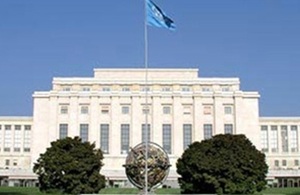Human Rights Council, Geneva : UK Statement on Resolution L32, 28 March 2014
UK Explanation of "No" Vote on Resolution L32 believing that existing international law sufficiently covers the use of remotely piloted aircraft.

The Human Rights Council takes place at the Palais des Nations in Geneva
“Ensuring use of remotely piloted aircraft or armed drones in counter-terrorism and military operations in accordance with international law, including international human rights and humanitarian law”
Mr President,
The UK has long held that counter-terrorism measures can only be effective when they are consistent with an approach which upholds the rule of law. Any counter-terrorism measures taken by States, including but not confined to the use of armed drones or RPAs, should comply with their obligations under international law. The UK further believes that existing international law sufficiently covers the use of RPAs.
The resolution L32 singles out RPAs as a ’special case’. This is something that we reject. Armed RPAs are a precision weapon and we welcome Special Rapporteur Ben Emmerson’s conclusions in his October 2013 report that they can reduce the risk of civilian casualties when used in accordance with international humanitarian law.
The UK supports HRC being able to discuss any issue legitimately within the scope of its mandate, including the promotion and protection of human rights when countering terrorism. To this end, we have co-sponsored the Resolution at this Council on the Protection of Human Rights and Fundamental Freedoms while Countering Terrorism which was adopted yesterday. However, we do not believe that the HRC is the appropriate forum to discuss weapons systems on a thematic basis.
The resolution includes references to international human rights law and international humanitarian law. When RPAs are used in the context of armed conflict the appropriate law is international humanitarian law and the HRC does not have a mandate to consider this.
In the light of these substantial points of concern, the UK ultimately determined that it could not support this resolution. We remain strong supporters of the human rights machinery. We sought to agree a compromise to meet Pakistan’s and the co-sponsors’ wishes, as well as to meet our own concerns, but this proved impossible to achieve.
For these reasons, the United Kingdom will call a vote on this resolution and vote ”no”.
Thank you, Mr President.